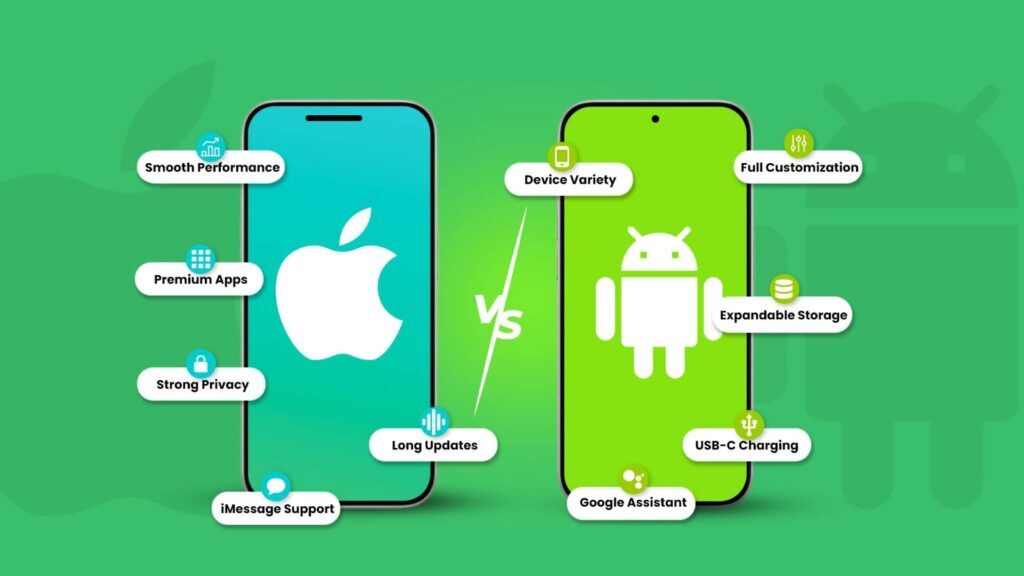iOS vs Android Comparison: Which One is Better

The debate between Android and iPhone users has been going on for years. Every platform has devoted followers and special features that meet certain requirements. To assist you in choosing between the iPhone and Android. We will go over the top differences in this blog. Let’s explore the iOS vs Android comparison: What is Android OS? Android OS is a mobile operating system that runs mostly on smartphones and tablets and is based on Linux. The Android platform consists of a web browser, a GUI, an operating system built on the Linux kernel, and downloadable end-user apps. The Apache v2 open source license, under which Android was launched. Android allows the development of several OS variants for different devices, including digital cameras and game consoles. Although the majority of Android devices come preinstalled with a suite of proprietary apps, including Google Maps, YouTube, Google Chrome, and Gmail, Android is based on open source software. What is Apple iOS? The operating system for the iPhone, iPad, and other Apple mobile devices is called Apple iOS. The operating system that powers Apple’s Mac desktop and laptop computers, Mac OS, is the foundation of Apple iOS. It is made to provide simple, seamless networking across a variety of Apple devices. When Apple unveiled its first iPhone in 2007, it introduced iOS, formerly known as iPhone OS. iOS vs Android Battle with Features Let’s have a detailed breakdown of iOS and Android selection having differentiation between the features and functionalities: 1. Hardware Selections Your device is comparable within the difference of Windows and macOS PCs. The only reputable hardware seller in the Apple ecosystem exists, but it’s premium and expensive. But with Android, the flexibility means that the users are not restricted to the Google Pixel smartphone line. To address you have to access dozens of hardware manufacturers with having avoid range of quality, performance, and price. Within $200, you can easily purchase a good Android phone like Samsung Galaxy A15 5G, and that’s a good purchase. In the comparison of iPhone SE, that is less expensive but available at $429. Moreover, the prices of some Samsung Galaxy Z Fold 6 combinations can be higher than $2000. On the other hand, within the amount of $2000, we can have the most expensive iPhone 16 Pro Max phone that has 1 TB storage but costs $1599. 2. Interface and Usability Android is an excellent operating system that offers customization options. If you don’t want to reach a particular configuration, you can create an attractive smartphone environment. Android offers more possibilities and smart options instead of iPhone. For example, let’s talk about Google. If the material on Google is redesigned with colors and synchronized options. You can change it and operate the system with a background connected appearance. I know it seems strange that iOS search features are better, but Android is a Google product. It can be visible, you say, through the device’s installed apps. No doubt Apple’s displace uninstall programs are attached to the links of the App Store. Even organizes the results into contacts, emails, and apps nicely. 3. Technology Support Every year, new wireless technology standards are released. In recent years, Android has been the first to adopt these new specifications. It was the first operating system to handle 5G networks. With capabilities for 4G LTE, wireless charging, and touchless voice instructions, it also beat Apple. Apple usually waits for new technology to become dependable and useful. Dual-screen and foldable phones are now supported by Android as well. Third parties, such as Microsoft, can add functionality to devices like the Surface Duo 2, an Android device with two panels that show customized content. Android phones are leading the way in these technologies, but they haven’t always been game-changing features. 4. Featured Applications Many stock apps from Google and Apple are available and start running on your phone as soon as it is turned on. Applications for email, web browsing, viewing and editing photos, recording and playing audio, playing videos, and editing documents and spreadsheets are a few examples. The absence of a task or to-do app is one Android error. For this, the Reminders app on iOS is incredibly sleek. Since chatting is the most popular smartphone activity, messaging apps are worth mentioning. With its feature-rich iMessage applications that offer Animoji, Memoji, games, and an iMessage app store, Apple has an advantage over Android in this way. Its Stickers feature, which turns a photo’s subject into a sticker that you can apply to any Note or iMessage, is incredibly addictive. 5. Third-Party Apps Previously, applications started on iOS before moving to Android. Adobe continues to do so, having introduced the tablet version of Photoshop on Apple hardware. Given Android’s overall stability in the tablet market, that makes sense. However, some apps now arrive on Android first. Android’s ability to install apps from non-Google app stores is another significant feature. The option to remotely install apps on your phone through the web is another benefit that isn’t available in the Apple store. Let’s say you are reading an article on your laptop when you notice an app. If it’s Android, installing it is as easy as going to the Play Store’s website. The iOS device must have the app installed. 6. iOS vs Android Security Although mobile OS systems have good security records and protections, Android provides additional ways for malware to get into your phone due to its openness. Specifically, apps are more likely to cause issues for Android, particularly if you install them from a different app store. Recent versions of Android have prioritized privacy, introducing several new safeguards against misuse by third-party apps. 7. iOS vs Android Privacy While iOS allows you to provide applications with your approximate position rather than your precise location, Android allows you to give them one-time access to your location and other confidential information. Given that Google’s entire business strategy depends on collecting user data, the search engine major finds it challenging to compete with Apple, whose business strategy doesn’t include profiling or monitoring. 8. Integration with Other
